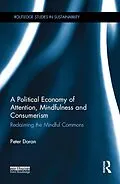Drawing together lively debates from the new economics of transition, resilience and well-being, sustainable consumption, and the emerging role of mindfulness in popular culture, this book speaks to audiences from both the sustainability disciplines and students of Buddhism and mindfulness. It shows that, in this consumer age, the underlying teachings of Buddhist mindfulness offer more than individual well-being at home and in the workplace, but also new sources of critical inquiry into our collective condition under the sway of consumer culture. Furthermore, the book provides a political economy context for the dramatic rise in popular interest around mindfulness practices and their associated Buddhist-inspired philosophical and psychological insights.
Vorwort
A beautifully illustrated non-fiction picture book that sensitively explains crises that dominate the news in an appropriate manner for children.
Autorentext
Peter Doran is a lecturer at the School of Law at Queen's University Belfast, Northern Ireland.
Zusammenfassung
The Children in Our World picture book series helps children make sense of the larger issues and crises that dominate the news in a sensitive and appropriate manner. With relatable comparisons, carefully researched text and striking illustrations, children can begin to understand what poverty and hunger are, how they affect people in countries all over the world and how readers can help those affected.
Where issues aren't appropriate to describe in words, award-winnning illustrator, Hanane Kai, uses striking and sensitive illustrations help children visualise the people and situations impacted by poverty and hunger with images that are suited to their age and disposition.
The series forms an excellent cross-curricular resource that looks at refugees, war, poverty and racism, and this book is ideal for tying into discussions on food, wealth and current affairs.
Inhalt
Chapter 1. Towards a 'Mindful Commons' - The Anthropocene and the Attention Revolution
Chapter 2. The Spirit of Activism: Non-Violence as a Way of Life
Chapter 3. The Cartesian Legacy
Chapter 4. Foucault, Zen and the Art of Challenging Consumerism
Chapter 5. Conclusions: Attention Deficit and Ecological Degradation Advance Together
